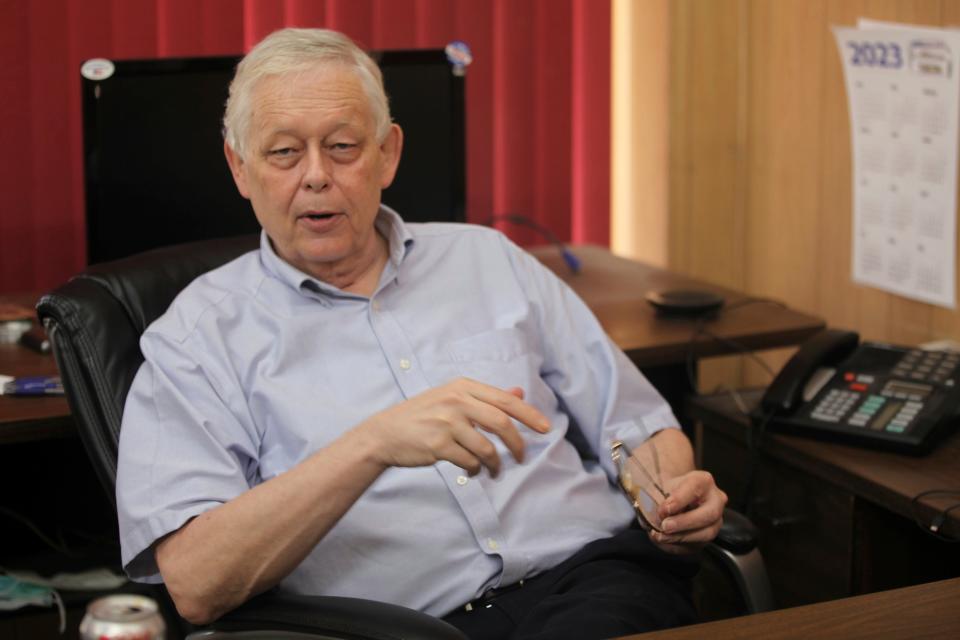Opinion: Why a raid on a small Kansas newsroom has wide repercussions
Last Friday, police officers in Marion, Kansas, raided the office of the Marion County Record, a local weekly newspaper, with a search warrant in hand. The officers took computers, cell phones and documents from the newsroom and then searched the home of publisher Eric Meyer. The day after the raid, Joan Meyer, the publisher’s mother and the paper’s co-owner, who had been at home while the police searched, died at the age of 98. And so, what started as a small-town matter has now generated a national — and even global — controversy, one that is unlikely to wane even though the police properly returned the seized material Wednesday.

This should never have happened. In a public statement, the police chief implied that he conducted the search for evidence that the paper may have committed a crime. That seems unlikely, especially given the department’s backtracking. But even if the facts change, it doesn’t matter. Newsroom searches are the most intrusive actions police can take to shut down reporting, especially reporting on their own activity. They are corrosive to the very fabric of our free society. That’s for two reasons.
First, in a letter authored by the Reporters Committee for Freedom of the Press and joined by over 35 news outlets and press freedom organizations, we explain to the Marion police chief that the wholesale seizure of the Record’s reporting equipment interfered with the paper’s ability to report the news. (Thankfully, through the outpouring of public support, they quickly had that capacity back.) But perhaps worse is the impact that police raids on journalists can have on the free flow of information more broadly. Sources with newsworthy information in the public interest just won’t come forward if they’re worried that it will get them in hot water with the police.
For exactly that reason, there are an array of federal and state laws that are meant to protect newsgathering from improper government scrutiny.
For instance, there is a federal law that effectively bars seizures of unpublished reporting material — draft articles, for instance — except in the rare cases where there is a threat to life and limb or when the journalist is suspected of a crime. For other newsgathering material — say, leaked documents or raw video footage — police need to first use an approach that can be negotiated or challenged by the affected journalist or news organization. That “subpoena first” policy reflects the law’s intention that newsroom searches should be the absolute last resort for police — not, like we saw in Marion, the first move.
Similarly, in Kansas itself, the state legislature recognized the importance of an independent press by passing a strong “shield” law that protects journalists from being forced to disclose the identities of their confidential sources and other sensitive information in court. Virtually all states have similar legal guardrails for journalists.
Importantly, most law enforcement professionals embrace these protections just as journalists recognize that police also have a job to do. Of course journalists are not above the law, but journalism is specifically protected by the law. To give just one example of how seriously other agencies treat their constitutional obligations, at the federal level, the U.S. attorney general must personally approve the search of a news entity’s premises. This is true even if prosecutors have real evidence that a journalist has broken the law.
Thankfully, raids on newsrooms are rare. When they do happen, public outcry is inevitable and serious consequences for the police department are likely. In 2019, for instance, the San Francisco Police Department raided the home of Bryan Carmody, an independent journalist who received an anonymous tip about the police investigation into the death of the city’s elected public defender. A judge promptly returned the material seized in that case, and the city paid a major settlement to Carmody. (The Reporters Committee was also involved in this matter and filed a Freedom of Information Act lawsuit to uncover more information on the raid.)
It’s too late to fully roll back the clock on Marion. The damage is done, even with the return of the material. The paper has retained a forensic firm to see if anything has been accessed, and, if police did in fact review confidential newsgathering material, that genie is out of the bottle. It remains essential that officials initiate an independent inquiry into the incident. And it is possible that a court will review the department's conduct and hold it accountable, if it finds wrongdoing.
Perhaps the one silver lining is that the world is watching a lesson in press freedom play out in a town of 2,000 named after a brigadier general in the Revolutionary War. The revolution cast off a number of our colonial encumbrances, including licensing of the press, which in England had led to – you guessed it – many raids on publishers. Two hundred and fifty years later, the story still needs to be told.
Brown is the Executive Director of the Reporters Committee for Freedom of the Press. Rottman directs the Reporters Committee’s Technology and Press Freedom Project.
This article originally appeared on Austin American-Statesman: Opinion: Controversy of Kansas newsroom unlikely to abate

